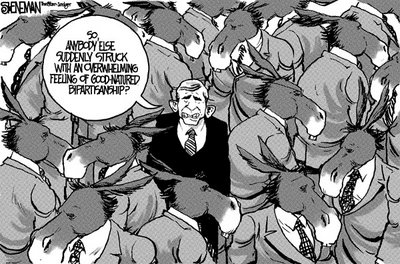An amazing night. I was up until about midnight watching the results, but didn't have the time for liveblogging.
First, give credit to the pundits: the general consensus of predictions (including my own) were right on. The Democrats picked up 28 seats in the House and 4 seats in the Senate (Pennsylvania, Missouri, Rhode Island, Ohio), with 2 Senate seats (Virginia and Montana) hanging in the balance. We may yet see a Democratic majority there.
The Dems also picked up 6 governorships, and now control a majority of those, as well as making serious gains at the statehouse level.
Some random thoughts:
Party makeup: On the one hand, I'm disappointed that the Democratic gains took an especially heavy toll on moderate Republicans. That's to be expected, since swing districts are pretty much by definition going to favor moderates in both parties. Santorum was a good scalp, and several Bush lapdogs went down. But Chafee, Steele and the like are the kind of people I'd like to see remain relevant in Republican circles.
Still, consider the long-term trends. In order to win, Democrats veered toward the center, electing conservative and moderate candidates in several key races. And the darling of the Netroots, Ned Lamont, got stuffed by the far more conservative Joe Lieberman. Nancy Pelosi may be liberal, but she will have to lead a caucus that will be decidedly more centrist than the one it replaces.
And as the Democrats grow more moderate, moderate elected Republicans are growing scarce. That will give conservatives and the religious right even more of a hold on the GOP. Unless they find a way to counter that, Republicans may find themselves ideologically purer but increasingly out of power.
Abortion and stem cells: The South Dakota abortion ban was shot down, showing that draconian restrictions on abortion still lack popular support in most of the country. California rejected a waiting period and parental notification for minors. The Missouri stem cell amendment looks like it will barely pass, which would seem to throw doubt on the theory that the amendment helped McCaskill. Arguably it helped Talent, as pro-life forces turned out to defeat the amendment.
Gay marriage: Arizona shot down a bill that would have outlawed civil unions as well as gay marriage. Five states passed bans on both. Two states outlawed gay marriage but not civil unions, though one of those states -- Colorado -- rejected a separate bill that would have legalized civil unions.
Taxes: South Dakota rejected a proposal to limit property tax increases, a Midwest version of California's Proposition 13 -- which has played havoc with that state's finances. South Carolina approved one. Three states rejected a Taxpayer's Bill of Rights, which would have put strict limits on tax increases. No broad restrictions on taxation power passed.
Eminent domain: Restriction on use of this power, a reaction to the Supreme Court's ruling in the New London case, passed in 9 states, while being rejected in two.
Minimum wage: Proposals to raise the minimum wage and index it to inflation passed in all six states where it was on the ballot.
Other initiatives: Voters in South Dakota soundly rejected proposals to strip judges of legal immunity on their rulings. Arizona approved making English the state's official language.
The picture that emerges is one of a centrist electorate that opposes gay marriage (and appears willing to ban civil unions if the two issues are chained together), but generally supports legal abortion and opposes handcuffing government's ability to raise revenue. Voters also support the social safety net, as reflected in the minimum wage proposals. The one place they want to rein in government power is eminent domain.
The administration: Bush, Rove and Ken Mehlman were required to be cheerleaders leading up to this election, but it's worth pointing out just how wrong they were about how things would turn out. Bush stumping in conservative areas and defending his decisions in Iraq probably hurt more than they helped. It may have helped fire up Bush's base, but that base is at 34 percent and falling, and meanwhile coverage of his speeches helped remind people not only of their opposition to the war, but Bush's refusal to concede mistakes or deal with the reality on the ground.
The big question now is how Bush will deal with a Democratic Congress -- and how that Congress will deal with him. Expect a smattering of investigations, as well as bills restricting the President's ability to authorize torture and eavesdropping. But also expect Bush to use his veto pen more. It comes down to whether Bush can get past his innate stubborness and actually compromise, and whether Democrats can get past thoughts of revenge and actually govern. The next few months should be telling, as they'll set the tone for the next two years.
Independents: We've now got two in the Senate: Lieberman and Bernie Sanders. Both have said they'll caucus with the Democrats, but it will be interesting to see what price they demand -- especially if control of the Senate hinges on their decision. Lieberman will probably get the committee assignments he would have gotten had he run and won as a Democrat; but Sanders will have some interesting negotiations. And the GOP may try to bribe Lieberman if the stakes are high enough. Lieberman has said he won't switch caucuses, but we'll see.
Fraud: While there were hiccups, the voting overall appeared to go smoothly. In part that's because most of the margins were beyond dispute. But I haven't seen any credible claims of widespread fraud -- and to their credit, Republicans don't seem to be raising that particular chant.
Turnout: Turnout seemed to be pretty high across the country, with some areas experiencing percentages normally reserved for presidential elections. This is excellent for all sorts of reasons, but the main one is that it dilutes the influence of money, partisanship and the parties' get-out-the-vote operations. That turnout may end up explaining why the GOP's acknowledged advantage in such operations failed to move the needle yesterday -- enough people were mad enough and motivated enough that it simply swamped such partisan efforts.
Money: A lot of money went into this election. According to Opensecrets.org, Congressional candidates raised a total of more than $1.2 billion and spent about $1 billion of that. A lot more money went into state-level races.
But all that money appeared to have a limited effect this year. In Michigan, the GOP candidate for governor spent $35 million of his own money -- and lost. In Rhode Island, the GOP candidate for Senate spent $7 million out of his own pocket -- and lost. In Congressional races, Republicans outspent Democrats by $27 million -- and lost.
The moral: Money helps. But in a race where the issues are stark and well-known, its influence is limited.
Attack ads: I'm not about to suggest this is a trend, but another thing I noticed about this election is the relative ineffectiveness of the usual negative polemics. Republicans trotted out their usual screeds about "liberal" and "tax and spend" and "negotiates with terrorists", but this time around those ads just seemed shrill and weak, not devastating. The optimist in me would like to think that this year was a wake-up call for voters, who have started to see such tactics for what they are -- long on innuendo, short on substance and accuracy, and doing more damage to the speaker than the target.
That's it for now. More later as I get time.
politics, midtopia


